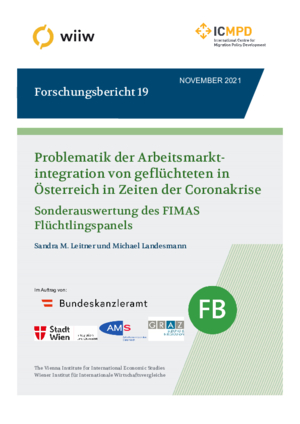Problematik der Arbeitsmarktintegration von geflüchteten in Österreich in Zeiten der Coronakrise - Sonderauswertung des FIMAS Flüchtlingspanels
Michael Landesmann and Sandra M. Leitner
wiiw Research Report in German language No. 19, November 2021
46 pages including 6 Tables and 6 Figures
This publication is available in German language only.
For a brief English summary see further below.
Diese Studie analysiert Effekte der Coronakrise auf die Arbeitsmarktintegration von in Österreich lebenden Asylberechtigten und subsidiär Schutzberechtigten aus den Herkunftsländern Syrien, Afghanistan, Irak und Iran. Die Analyse basiert auf einem Panel von Flüchtlingen, die sowohl an der dritten Welle der sogenannten FIMAS Befragung (im Frühjahr 2019) als auch der vierten Welle (im Herbst 2020) teilgenommen haben. Der Vergleich der Arbeitsmarktsituation dieser Personengruppe im Frühjahr 2019 – vor Beginn der Coronakrise – mit jener im Herbst 2020 – während der Coronakrise – ermöglicht eine genaue Analyse der Effekte der Coronakrise auf die Arbeitsmarktintegration dieser Flüchtlingsgruppe. Folgendes sind die wichtigsten Resultate dieser Studie: Insgesamt blieben viele der Flüchtlinge in Beschäftigung oder wechselten entweder aus der Arbeitslosigkeit oder der Inaktivität in die Beschäftigung. Jedoch erfuhren weibliche Geflüchtete und Geflüchtete mit hohem (tertiärem) Ausbildungsniveau während der Coronakrise eine Verschlechterung ihrer Arbeitsmarktsituation.
English Summary
Labour market integration of refugees in Austria in times of the Corona crisis
Special analysis of the FIMAS Refugee Panel
This study analyses the effects of the Corona crisis on the labour market integration of recognised refugees and beneficiaries of subsidiary protection from Syria, Afghanistan, Iraq and Iran who live in Austria. The analysis is based on a panel of refugees who participated in both the third wave of the so-called FIMAS survey (conducted in spring 2019) and the fourth wave (conducted in autumn 2020). The comparison of the labour market situation of this group of refugees in spring 2019 - before the start of the Corona crisis - with that in autumn 2020 - during the Corona crisis - allows a detailed analysis of the effects of the Corona crisis on their labour market integration. The following are the main findings of this study: Overall, many of the refugees remained in employment or moved either from unemployment or inactivity into employment. However, female refugees and refugees with high (tertiary) education levels experienced a deterioration of their labour market situation during the Corona crisis.
Keywords: Flüchtlinge, Coronakrise, Arbeitsmarkttransitionen, atypische Beschäftigung, Berufsverläufe
JEL classification: J24, J61, J62
Countries covered: Austria
Research Areas: Labour, Migration and Income Distribution
